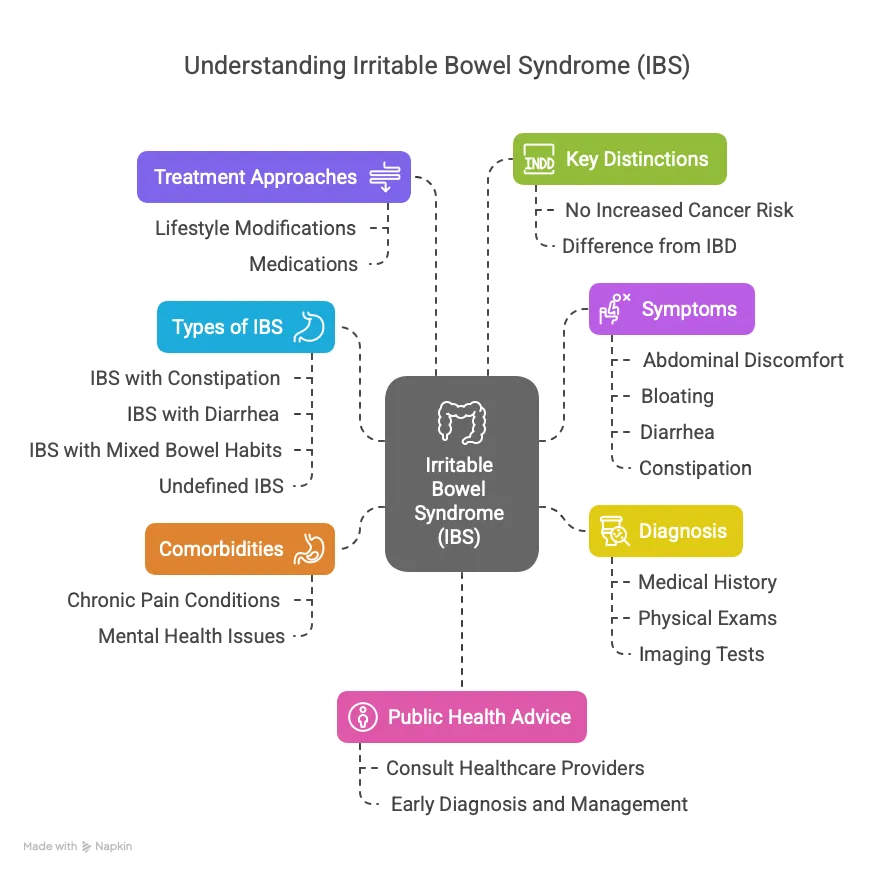UPSC
The Hindu Briefs
Irritable Bowel Syndrome: A Public Health Perspective
Last Updated
4th April, 2025
Date Published
4th April, 2025
Share This Post With Someone
.webp?2025-04-04T04:39:42.404Z)
Irritable Bowel Syndrome (IBS) is a prevalent gastrointestinal disorder with significant implications for public health, healthcare systems, and quality of life. As a chronic condition affecting a notable portion of the population, understanding its symptoms, prevalence, and management is crucial for aspirants preparing for competitive exams, particularly in areas related to health policy, social welfare, and medical governance.
Key Points from the Article
- Awareness Month:
- April is recognized as IBS Awareness Month to promote understanding of this common yet often stigmatized gastrointestinal disorder.
- Definition and Nature:
- IBS is a chronic, generally lifelong, functional gastrointestinal disorder characterized by a disrupted gut-brain connection.
- It involves how the gut and brain interact, leading to symptoms without structural damage to the intestines.
- Prevalence in India:
- A 2023 consensus by the Indian Neurogastroenterology and Motility Association estimates IBS prevalence in India ranges from 0.4% to 4.2%.
- This figure may underestimate the true disease burden due to underreporting and lack of awareness.

- Types of IBS:
- IBS with Constipation (IBS-C): Characterized by predominant constipation and abdominal discomfort.
- IBS with Diarrhea (IBS-D): Marked by frequent diarrhea alongside abdominal discomfort.
- IBS with Mixed Bowel Habits (IBS-M): Features alternating diarrhea and constipation with abdominal discomfort.
- Undefined IBS (IBS-U): Symptoms vary and do not fit neatly into other categories.
- Symptoms:
- Common symptoms include abdominal discomfort, bloating, diarrhea, constipation, or alternating bowel habits.
- Symptoms can significantly impact daily life and social functioning.
- Diagnosis:
- No definitive test exists; diagnosis relies on a complete medical history and symptom assessment.
- Physical exams and tests like blood tests, stool tests, and breath tests (for bacterial overgrowth) may be conducted.
- Imaging tests such as colonoscopy, upper endoscopy, or scans may be used to rule out other conditions.
- Comorbidities:
- Many IBS patients experience coexisting chronic pain conditions like fibromyalgia, chronic pelvic pain, or chronic fatigue syndrome.
- Mental health issues such as anxiety, depression, and sleep disturbances are also common among IBS sufferers.
- Treatment Approaches:
- Focuses on symptom management rather than a cure.
- Lifestyle Modifications: Include regular exercise, 7-9 hours of sleep nightly, and stress-reducing relaxation techniques.
- Medications: Options include fiber supplements, laxatives, pain relievers, antispasmodics, probiotics, or antidepressants, tailored to symptoms.
- Treatment varies based on individual symptom profiles.
- Key Distinctions:
- IBS does not increase the risk of colon cancer, unlike some other gastrointestinal conditions.
- It differs from Inflammatory Bowel Disease (IBD), which involves inflammation and structural changes in the gut.
- Public Health Advice:
- Individuals with symptoms should consult healthcare providers for accurate diagnosis and tailored treatment plans.
- Early diagnosis and management can improve quality of life and reduce healthcare burdens.
Glossary
- Functional Gastrointestinal Disorder: A condition affecting gut function without visible structural damage.
- Gut-Brain Connection: The interaction between the digestive system and the brain influencing health conditions like IBS.
- Fibromyalgia: A chronic condition causing widespread musculoskeletal pain and fatigue.
- Colonoscopy: A procedure using a camera to examine the colon for abnormalities.
- Probiotics: Live microorganisms that may improve gut health when consumed.
- Inflammatory Bowel Disease (IBD): A group of disorders causing chronic inflammation of the digestive tract, distinct from IBS.
- Prevalence: The proportion of a population affected by a particular condition at a given time.
Link To The Original Article – https://www.thehindu.com/sci-tech/health/all-you-need-to-know-about-irritable-bowel-syndrome/article69407112.ece